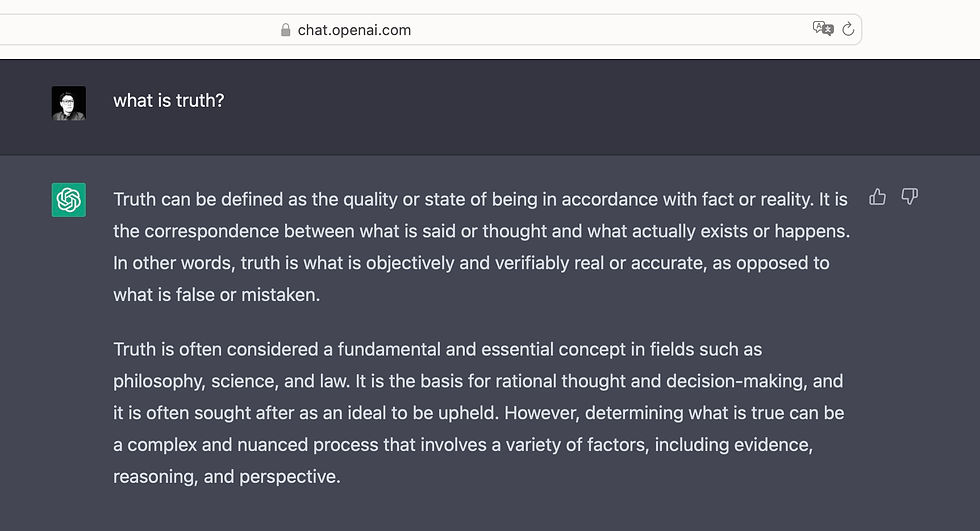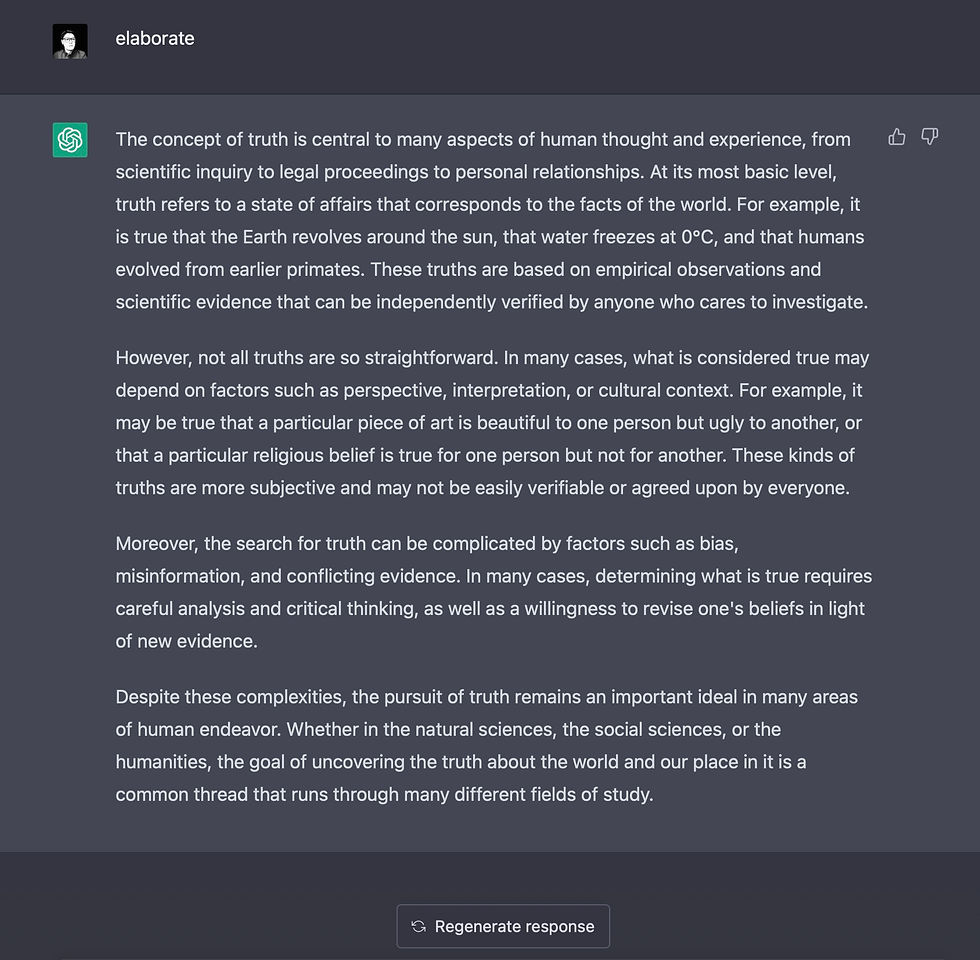What is truth?
- nelson ang

- Mar 22, 2023
- 5 min read
“Not this man, but Barabbas!”

Then Pilate said to him, “So you are a king?” Jesus answered, “You say that I am a king. For this purpose I was born and for this purpose I have come into the world—to bear witness to the truth. Everyone who is of the truth listens to my voice.” Pilate said to him, “What is truth?” - John 18:37- 38a (ESV)
Pontius Pilate asked the question “what is truth?”; so asking in exasperation and despair. Inevitably. Despair descends when there is no way to establish truth. The question is perhaps an ancient day equivalent of WTF… Indeed, should Pilate come to know that his name is forever etched in the Apostles’ Creed as the one who killed the Christ , surely he will curse, "WTF!"
The Apostles’ Creed: I believe in God, the Father almighty, creator of heaven and earth. I believe in Jesus Christ, his only Son, our Lord, who was conceived by the Holy Spirit and born of the virgin Mary. He suffered under Pontius Pilate, was crucified, died, and was buried; he descended to hell. The third day he rose again from the dead. He ascended to heaven and is seated at the right hand of God the Father almighty. From there he will come to judge the living and the dead. I believe in the Holy Spirit, the holy catholic church, the communion of saints, the forgiveness of sins, the resurrection of the body, and the life everlasting. Amen.
For centuries and by the millions, on a weekly basis, confessional Christians recite the Creed and firmly put Pilate back in the dock. It was arguably not his fault; maybe he scoffed at Jesus because he saw this coming. The sequence of events began with Pilate wanting no part in the affairs of the Jews. Then he found no wrong in Jesus and wanted to release Him. It was the mob who would have none of it. To further push for the release of Jesus, he offered them a trade and they chose a criminal instead.
After he had said this, he went back outside to the Jews and told them, “I find no guilt in him. But you have a custom that I should release one man for you at the Passover. So do you want me to release to you the King of the Jews?” They cried out again, “Not this man, but Barabbas!” Now Barabbas was a robber. - John 18:38b - 40 (ESV)
So in exasperation and with a riot brewing, Pilate decried the execution and exonerated himself of the blood of Christ. The mob duly absolved him.
So when Pilate saw that he was gaining nothing, but rather that a riot was beginning, he took water and washed his hands before the crowd, saying, “I am innocent of this man's blood; see to it yourselves.” And all the people answered, “His blood be on us and on our children!” Then he released for them Barabbas, and having scourged Jesus, delivered him to be crucified. - Matthew 27:24 - 26 (ESV)
But could Pilate really be absolved? Can there be innocence when truth is not upheld? What is truth? Perhaps artificial intelligence might provide Pilate with a satisfactory answer, albeit 2000 years late? Better late than never, I suppose. Perchance our despair may be alleviated though Pilate's name cannot be scrubbed from the Apostles' Creed. So, on behalf of Pilate and us all, I asked ChatGPT “What is truth?"

Two axes emerge from dissecting ChatGPT’s treatise - what is said or thought and what actually exists or happens; the former being generated internally and subjectively, the latter existing externally and objectively, hence verifiable, and therefore real. The subject is thereby gently implored to ensure that his subjectively generated ideas and words align themselves with objective, verified facts that exist out there. That appears all well and fine, matter-of-fact indeed. However, is it possible that these “facts” are yet someone else’s construct, for example the theory of evolution? So I asked ChatGPT to elaborate.

ChatGPT’s elaboration throws up a few more conditions for truth - empirical observations, scientific evidence, and independent verification by someone who bothered. These are however easy truths, though one of the examples snuck in is far from easy, obvious, nor observable! Some other “kinds of truths are more subjective” and these require consensus, are constantly changing along with the evidence, and we ought to keep an open mind. Are those who bother to verify truths naturally and necessarily open-minded and should therefore be allowed to decree what counts as evidence and thus ordained the arbiters of truth? If a truth changes, was it still true before the change or has it become truer after changing?
A statement of truth explains the meaning or delineates the constitution of a word, idea, phenomenon, or object. In other words, it proffers a definition. The word "definition" is derived from the Latin word "definitio", which is derived from the verb "definire". "Definire" is an amalgamation of two Latin words, "de-" meaning "away from" or "down from", and "finis" meaning "boundary" or "limit". Therefore, "definire" originally meant "to establish limits" or "to set boundaries", and "definitio" came to signify "the act of setting boundaries" or "the imposition of limitations”.
That is why finite objects and phenomena, such as the earth revolving around the sun and water freezing at 0 degree celsius, can be defined without much dispute. These truths are limited and therefore unchanging. However, are the ways with which can we define truth also finite, such that we might answer Pilate’s question definitively? How might limits be placed on other transcendentals such as goodness and beauty?
Does it then mean that an “unconquerable will” can bend realities, which cannot be neatly limited and are therefore flaccid, towards my desire? So that the external and objective aligns with my internal and subjective instead of ChatGPT's insistence that it should be the other way round? For if we have the courage never to submit or yield to the tyranny of reality; then what is else not to be overcome in this rebellion?
All is not lost; the unconquerable Will, And study of revenge, immortal hate, And courage never to submit or yield: And what is else not to be overcome? That Glory never shall his wrath or might Extort from me. To bow and sue for grace With suppliant knee, and deifie his power Who from the terrour of this Arm so late Doubted his Empire, that were low indeed, That were an ignominy and shame beneath This downfall; since by Fate the strength of Gods And this Empyreal substance cannot fail, Since through experience of this great event In Arms not worse, in foresight much advanc't, We may with more successful hope resolve To wage by force or guile eternal Warr Irreconcileable, to our grand Foe, Who now triumphs, and in th' excess of joy Sole reigning holds the Tyranny of Heav'n - John Milton, Paradise Lost
Jesus told Pilate, "Everyone who is of the truth listens to my voice.” However, Pilate chose to listen to the mob instead. In so doing, he suppressed his own finding that Jesus is without guilt. Pilate denied truth and rebelled against reality, in no dissimilar fashion to Satan’s rebellion against the reality of God’s reign. Pilate did not need an answer to his question; he needed truth to not exist. What about us?




Comments